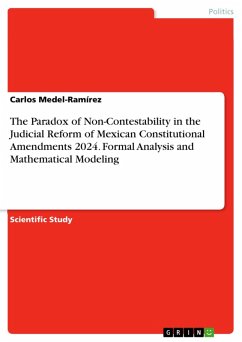
Computational and Mathematical Modeling in the Social Sciences (eBook, PDF)

PAYBACK Punkte
12 °P sammeln!
Mathematical models in the social sciences have become increasingly sophisticated and widespread in the last decade. This period has also seen many critiques, most lamenting the sacrifices incurred in pursuit of mathematical rigor. If, as critics argue, our ability to understand the world has not improved during the mathematization of the social sciences, we might want to adopt a different paradigm. This book examines the three main fields of mathematical modeling - game theory, statistics, and computational methods - and proposes a new framework for modeling. Unlike previous treatments which ...
Mathematical models in the social sciences have become increasingly sophisticated and widespread in the last decade. This period has also seen many critiques, most lamenting the sacrifices incurred in pursuit of mathematical rigor. If, as critics argue, our ability to understand the world has not improved during the mathematization of the social sciences, we might want to adopt a different paradigm. This book examines the three main fields of mathematical modeling - game theory, statistics, and computational methods - and proposes a new framework for modeling. Unlike previous treatments which view each field separately, the treatment provides a framework that spans and incorporates the different methodological approaches. The goal is to arrive at a new vision of modeling that allows researchers to solve more complex problems in the social sciences. Additionally, a special emphasis is placed upon the role of computational modeling in the social sciences.
Dieser Download kann aus rechtlichen Gründen nur mit Rechnungsadresse in A, B, BG, CY, CZ, D, DK, EW, E, FIN, F, GR, HR, H, IRL, I, LT, L, LR, M, NL, PL, P, R, S, SLO, SK ausgeliefert werden.













